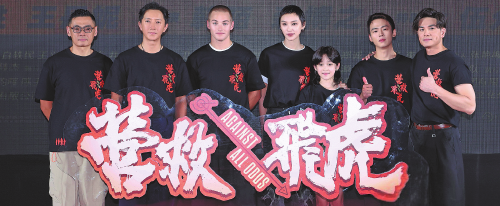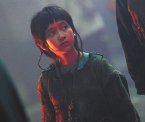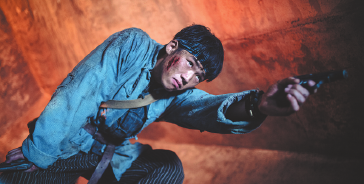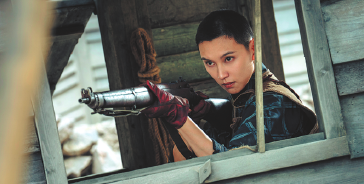
Online Scan the code to watch the video.

Director Lau Ho-leung (left) and the cast of the World War II-set film Against All Odds share behind-the-scenes stories at the premiere recently held in Beijing.

Actor Philip Ng Wan-lung plays a Chinese guerrilla veteran of the Dongjiang Column.

Han Geng as an underground operative for the Communist Party of China.

Han Geng as an underground operative for the Communist Party of China.

Child actress Han Mo plays a young fighter, also a member of the Chinese guerrilla team.

Actor Chen Yongsheng stars as a member of the Chinese guerrilla team.

Actress Louise Wong Tan-ni also plays a role in the guerrilla team.
In February 1944, American pilot Donald W. Kerr took part in a mission to bomb Kai Tak airport in Hong Kong, which the Japanese had converted into a military air base after occupying the city, formerly under British rule, during World War II.
During the raid, Kerr's fighter plane was struck by enemy fire, forcing him to bail out by parachute into Japanese-controlled territory. For the next 27 days, he was sheltered and moved to safety by members of the Dongjiang (East River) Column, a guerrilla force led by the Communist Party of China.
Inspired by real-life stories and historical archives, Against All Odds, the latest directorial work by Hong Kong filmmaker Lau Ho-leung, released in domestic theaters on Sept 3, condenses the rescue operation into a tense 48-hour race against time.
The movie begins with James, an American pilot who is shot down and captured by Japanese forces and publicly tortured in a cage at a local bowling alley as a form of humiliation. By chance, the bowling alley's owner, a covert Party operative originally planning to assassinate a Japanese officer, joins forces with four Chinese guerrillas to rescue James and escort him to a military base in Guilin, Guangxi Zhuang autonomous region.
Actor Han Geng, who plays the operative, tells China Daily that his character, Huanshao (Smiley), is a complex and tragic figure. As the sole survivor of a failed mission in Shanghai, where he witnessed more than 20 fellow Party operatives sacrifice their lives, the role forced him to conceal his grief behind a perpetual, fabricated smile.
"As an actor, one of the most interesting parts is that you can always gain new knowledge by stepping into someone else's shoes and experiencing their life," says Han.
For the star, who grew up in Northeast China's Heilongjiang province, preparing for the film was an educational experience, diving into the history of the Hong Kong-Kowloon Independent Brigade of the Dongjiang Column, a guerrilla force founded by locals in 1940 to fight against Japanese invaders.
As a major force led by the Communist Party of China in Guangdong province, the Dongjiang Column took part in over 1,400 engagements, eliminating more than 9,000 enemies, and establishing a revolutionary base area spanning 15,000 square kilometers with a population of 4.5 million.
One of the column's most internationally known contributions was using its knowledge of the local terrain and covert networks to successfully smuggle more than 800 individuals — including cultural figures like novelist Mao Dun, Allied prisoners of war, and downed airmen — through Japanese lines into unoccupied territory during the early 1940s.
Speaking about his role, a versatile operative who speaks Cantonese, Japanese, and English, Han shares that the character's background is rooted in actual history, as one of the column's distinctive characteristics was its many well-educated members, including college graduates and those who had studied overseas.
Mitchell Hoog, the American actor cast as the rescued pilot, says he immediately recognized the role as an opportunity to portray real courage upon receiving the script.
"Because this is a historical story, there's so much touching material to pull from," says Hoog, who was handed a trove of historical material for the role, including photographs, videos, and Kerr's personal journal. These resources made him feel "like a kid in a candy shop (of history)".
With his grandfather, father, and cousin being pilots, Hoog also reveals that he has dreamed of flying since childhood. Drawing on this fascination, he shares a poignant detail uncovered in his research: wartime pilots often kept a small bag inside their jackets containing personal items — a family photograph or a cherished gift — to ease the pain of separation.
"When you're in a cockpit for hours and hours every day, you have to make it feel like home somehow — a picture, music, or whatever it is. I think they all brought certain things with them," he adds.
"One of the most amazing things about studying this history is realizing how young the pilots were," says Hoog, adding that he once found it hard to imagine the self-sacrifice it took to bravely risk their lives at just 20 years old or younger to safeguard their country.
"As an actor, you can only hope to capture even 2 percent of that on film. This is a story about humanity, courage, and bravery, and it doesn't matter where you're from."
In the film, there is also a clever homage to the real history. In the final scene, pilot James, having escaped the Japanese, sits on a rock to light a cigarette from a guerrilla fighter. This moment mirrors a black-and-white photograph taken during the Chinese People's War of Resistance Against Japanese Aggression (1931-45), which captured an American soldier borrowing a light from a Chinese laborer, according to director Lau.
Actress Louise Wong Tan-ni, who plays the only female soldier among the four guerrilla members, also shares her experience of visiting a local memorial hall in Guangdong that commemorates the column and reading veteran archives to learn about the female fighters in the forces, a group estimated to have hundreds of members.
Speaking of her character — a single mother who lost three daughters during the war — Wong expresses her respect and awe.
"She (the character) represents the ordinary people who stepped onto the battlefield. Their courage and willingness to sacrifice everything so the next generation could live in peace deserve to be forever remembered," Wong says.
Contact the writer at xufan@chinadaily.com.cn

